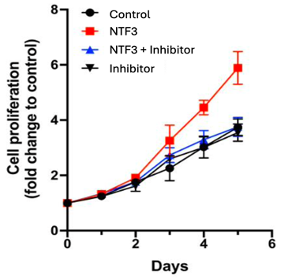Summary
Liver transplantation is the only cure for end-stage liver disease, but donor organ scarcity limits access for millions. Split liver transplantation could help bridge this gap, but the regeneration of partial organs is critical to broadly implementing this approach. Vanderbilt University researchers have identified a growth factor that promotes liver growth that could be used to improve patient outcomes and increase accessibility to liver transplantation.
Addressed Need
End-stage liver disease affects nearly 5 million Americans (CDC), yet only about 10,000 liver transplants are performed annually in the US due to the limited supply of donor organs. Split liver transplantation, in which one organ is divided between two patients or a living donor donates half of their liver to a patient, could significantly expand the supply of transplant livers. However, this approach is currently plagued by issues in graft function and liver regrowth, resulting in patients enduring a highly vulnerable post-transplant period and complications that often prove fatal. Technologies that promote liver regeneration could, therefore, support both transplant patients and living donors, improving outcomes and expanding the donor organ pool.
Technology Description
This technology is a novel growth factor that drives liver regeneration. While initially described in the central nervous system, neurotrophin-3 (NTF3) has recently been identified as a potent stimulator of liver regrowth. In vitro and in vivo work in human liver cells show that NTF3 induces liver cell proliferation and drives the growth signaling pathways that determine liver size.
Competitive Advantage
There are currently no clinically available therapies that effectively induce liver regrowth. Unlike other identified liver growth factors that cannot be delivered systemically, NTF3 is serum-stable and bioavailable to the liver when administered intravenously. In mouse models of liver regeneration, systemically administered NTF3 drove local induction of cell replication that resulted in overall liver growth of up to 23%.
Stage of Development
This technology has been validated using in vivo mouse models of liver regeneration and in vitro murine and human liver cell replication models. We are seeking commercial partners to develop this technology for clinical applications.

In vitro proliferation assay of human immortalized liver cells treated with vehicle (control), NTF3, NTF3 + inhibitor, or inhibitor alone demonstrates that NTF3 significantly increases the proliferation of liver cells.




